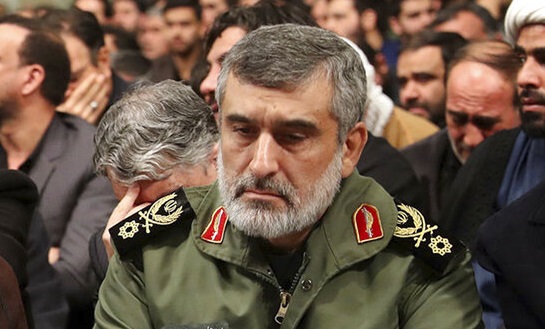“This is not a covert operation against a military facility. This is an attack on the world’s trade routes.”
By Pesach Benson, United With Israel
In a briefing to foreign envoys, Israel named and shamed the Iranian commanders responsible for last week’s deadly attack on an oil tanker in the Gulf of Oman.
Foreign Minister Yair Lapid and Defense Minister Benny Gantz in Jerusalem briefed the ambassadors from states on the UN Security Council on Wednesday.
“Amir Ali Hajizadeh, commander of the [Iranian Revolutionary Guard Corp’s] Air Force, is behind dozens of terror attacks in the region employing UAVs and missiles,” Gantz said. “For the first time ever, I will also expose the man who is directly responsible for the launch of suicide UAVs — his name is Saeed Ara Jani and he is the head of the IRGC’s UAV command.”
“The UAV command conducted the attack on Mercer Street,” Gantz added. “Saeed Ara Jani plans and provides the training and equipment to conduct terror attacks in the region.”
Lapid stressed that Iran is a threat to international shipping and called for an international response. But he also stressed that Israel is prepared to act alone, if necessary.
“This is not a covert operation against a military facility. This is an attack on the world’s trade routes, this is an attack on freedom of movement, this is an international crime,” Lapid asserted. “What is the international community going to do about it?” he asked. “Is there still such a thing as international law? And does the world have the ability and willpower to enforce the law?”
The Mercer Street was attacked by multiple suicide drones in the Gulf of Oman on Thursday. The tanker’s Romanian captain and a British security guard were killed. The ship is owned by the London-based Zodiac Maritime, which is owned by Israeli shipping tycoon Ofer Eyal. The ship sailed on its own power to the UAE with a U.S. Navy escort.
Further maritime attacks
Further underscoring the Iranian threat, on Tuesday, six oil tankers off the coast of Fujairah, United Arab Emirates, announced around the same time via their Automatic Identification System trackers that they were “not under command,” according to MarineTraffic.com. That typically means a vessel has lost power and can no longer steer.
Also on Tuesday near Fujairah, armed intruders boarded the Asphalt Princess in an apparent attempt to hijack the ship and divert it to Iran. The Times of London reported that the crew foiled the hijacking by sabotaging the engines. The intruders fled as U.S. and Omani naval ships arrived on the scene.
In a radio call, a crew member can be heard telling the Emirati Coast Guard that five or six armed Iranians had boarded the tanker.
“Around 5-6 (Iranians) on board”
Message from the crew of the Asphalt Princess to the UAE Coast Guard pic.twitter.com/MjCR4p937g
— OSINTtechnical (@Osinttechnical) August 4, 2021
Iran denies it attacked the Mercer Street or the other vessels.
The shadow war
With the attack on Mercer Street, Iran escalated its shadow war with Israel on the high seas. Since 2019, Israel has reportedly attacked numerous Iranian vessels illicitly carrying weapons and oil bound for Syria.
In February, the Israeli-owned Helios Ray was damaged in a mysterious explosion attributed to Iran while traversing the Gulf of Oman. In March, the Israeli-owned Lori was hit by a missile in the same area. In April, the Saviz, an Iranian intelligence-gathering ship, was struck by a mine in the Red Sea. In June, the Kharg, the largest ship in the Iranian Navy caught fire and sank in the Gulf of Oman. In July, Iran attacked the CSAV Tyndall, erroneously believing the cargo ship was also owned by Ofer. The ship had been sold several months earlier.
Iran is known to have transferred drone technology to its allies and proxies, such as Hamas, Hezbollah, Houthis, and Shiite militias in Iraq. But analysts believe that the attack on the Mercer Street could only have been carried out by Iran itself, due to the sophistication of operating several multiple drones and complexity of attacking a moving ship on the high seas.
In 2019, Iran’s Revolutionary Guard detained a British-flagged tanker, the Stena Impero, near the Strait of Hormuz. Last year, an oil tanker sought by the U.S. for allegedly circumventing sanctions on Iran was hijacked off the Emirati coast and later ended up in Iran, though Tehran never acknowledged the incident.
The Mercer Street attack also comes amidst the backdrop of Iran transitioning to a new administration led by hard-line President-elect Ebrahim Raisi.
Associated Press contributed to this report.
